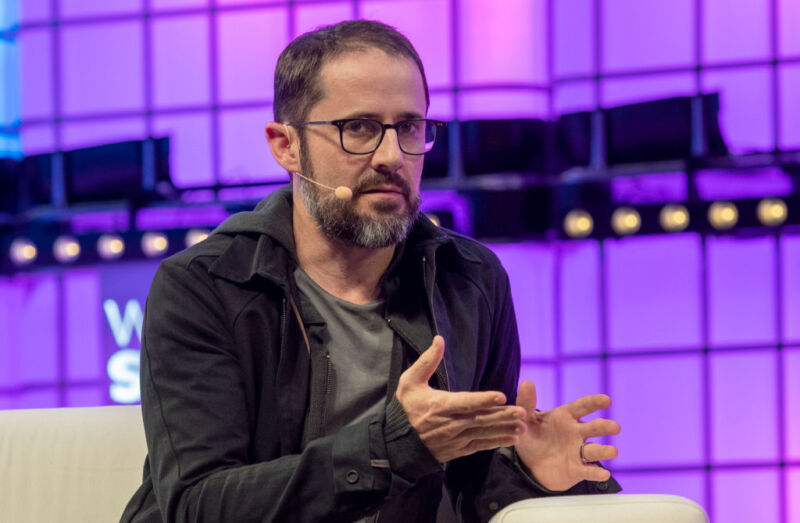
Twitter co-founder Evan “Ev” Williams has broken his silence and joined other co-founders in expressing his dismay at how Elon Musk is running the platform.
In his first public remarks on Musk’s leadership since Musk’s Twitter takeover, Williams told Bloomberg’s “The Circuit” yesterday that after Musk’s purchase went through, he felt “sad.”
Ever since, he hasn’t been encouraged by developments at Twitter. The company’s ongoing financial struggles include most recently recording a five-week period from April to May, where its advertising revenue dropped by 59 percent, compared to ad revenue at the same time last year.
Many believed that Twitter’s new CEO Linda Yaccarino, who started this week, would bring advertisers back to the platform. But Twitter’s ad staff thinks that advertisers might still be spooked by shifting Twitter policies leading to more controversial content, like pornography and hate speech, as well as more controversial ads promoting things like gambling and marijuana, The New York Times reported. It seems that many top advertisers are still hesitant to risk brand damage by reinvesting in Musk’s Twitter.
“I don’t think he’s dialed it in quite right yet,” Williams told Bloomberg, warning that Twitter’s potential to recover as a brand is now “much harder” now that “the brand is very linked to Elon.”
Williams said that poor leadership caused once-popular platforms like Yahoo and MySpace to fail, suggesting that it’s appropriate to compare Twitter today to Yahoo. He said that while Yahoo still exists and could be perceived as “thriving,” that “reputationally, it’s very different,” and that’s the path that Musk seems to be taking Twitter down.
Williams’ remarks come just a few months after Twitter co-founder Jack Dorsey tweeted that he didn’t think Musk was an ideal leader for Twitter, The Washington Post reported. When a Twitter user told Dorsey that “it’s pretty sad how it all went down” regarding Musk’s Twitter purchase, Dorsey tweeted in resounding agreement: “Yes.”
Williams and Dorsey had been perhaps the most optimistic about Musk becoming—as Musk described his role at Twitter—Chief Twit. Another co-founder, Biz Stone, stepped up first to express disapproval in a vague December 2022 tweet that never mentioned Musk by name.
“He’s not a serious person,” Stone tweeted. “He does things for sport that have serious consequences for real people. This is an open, global service.”
The only other Twitter co-founder, Noah Glass, rarely speaks about Twitter and is seemingly the only one to decline to share an opinion on Musk’s leadership.
Williams has “weird relationship” with Twitter
Williams was joined on “The Circuit” by former Twitter vice president of product Jason Goldman, who told Bloomberg that Twitter has already survived several attempts by its founding leadership to “kill the product.” Williams agreed that Twitter is a resilient product, calling Twitter “anti-fragile.”
Williams then suggested that emerging Twitter alternatives could easily take Twitter’s place if Musk fails to improve the product or if they simply offer better services or more innovative products.
But Williams also said that he’s had “a weird relationship with Twitter” that seems to exist between appreciation for what it is and disinterest in what it could become.
In 2022, he said that he was “excited” for Musk to take over the platform, while warning that Musk should have “respect for the people who have been shepherding” the company, “especially on the trust and safety side.” Musk did not heed that advice, dissolving Twitter’s trust and safety council, drastically reducing the trust and safety team, and then seemingly driving resignations of trust and safety chief Yoel Roth and Ella Irwin. And that’s seemingly a big part of what’s made Williams “sad” about Twitter these days.
Of Musk, Williams said, “I think he’s brilliant. But no one’s brilliant on everything.”
However, Williams seemingly doesn’t necessarily view social media as relevant today as he used to.
Williams said that in social media’s early beginnings, “We thought, oh, the best would be if we got media from our friends,” but now the growing popularity of TikTok is showing him that, to many users, “showing them media from your friends is probably not as good as the media from some super talented person who you’ve never met before.”
“I actually think there’s tons of interesting things now if we think about how do we use the Internet to help people be more social without consuming or creating media, so maybe the future of social media is the separation of social and media,” Williams suggested, seemingly indicating that Twitter and other traditional social media platforms might not have as prominent a place in that hypothetical version of the future.
For Musk to succeed, Williams said the Twitter owner would likely have to be prepared to continue taking on a huge loss.
“I don’t know how comfortable Elon is with losing billions of dollars,” Williams told Bloomberg. “Maybe he is—fine. Maybe he can get to break even and then just play with it. If a hundred million people in the world share the most interesting idea or thought, and the computers could algorithmically give you the most interesting slice of that, that’s a hell of a media service—but I also think, generally, the new thing does not come from the old thing.”
Williams did not immediately respond to Ars’ request for comment. Twitter does not respond to requests for comment.
https://arstechnica.com/?p=1946831

